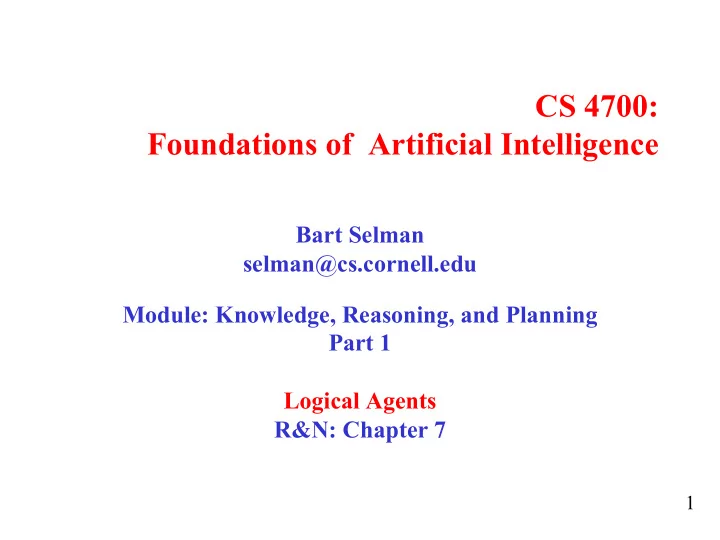

CS 4700: Foundations of Artificial Intelligence Bart Selman selman@cs.cornell.edu Module: Knowledge, Reasoning, and Planning Part 1 Logical Agents R&N: Chapter 7 1
A Model-Based Agent 2
Knowledge and Reasoning Knowledge and Reasoning: humans are very good at acquiring new information by combining raw knowledge, experience with reasoning. AI-slogan: “Knowledge is power” (or “Data is power”?) Examples: Medical diagnosis --- physician diagnosing a patient infers what disease, based on the knowledge he/she acquired as a student, textbooks, prior cases Common sense knowledge / reasoning --- common everyday assumptions / inferences. e.g., (1) “lecture starts at four” infer pm not am; (2) when traveling, I assume there is some way to get from the airport to the hotel. 3
Logical agents: Agents with some representation of the complex knowledge about the world / its environment, and uses inference to derive new information from that knowledge combined with new inputs (e.g. via perception). Key issues: 1- Representation of knowledge What form? Meaning / semantics? 2- Reasoning and inference processes Efficiency. 4
Knowledge-base Agents Key issues: – Representation of knowledge à knowledge base – Reasoning processes à inference/reasoning Knowledge base = set of sentences in a formal language representing facts about the world (*) (*) called Knowledge Representation (KR) language 5
Knowledge bases Key aspects: – How to add sentences to the knowledge base – How to query the knowledge base Both tasks may involve inference – i.e. how to derive new sentences from old sentences Logical agents – inference must obey the fundamental requirement that when one asks a question to the knowledge base, the answer should follow from what has been told to the knowledge base previously. (In other words the inference process should not “ make things ” up…) 6
A simple knowledge-based agent The agent must be able to: – Represent states, actions, etc. – Incorporate new percepts – Update internal representations of the world – Deduce hidden properties of the world – Deduce appropriate actions –
KR language candidate: logical language (propositional / first-order) combined with a logical inference mechanism How close to human thought? (mental-models / Johnson- Laird). What is “the language of thought”? Greeks / Boole / Frege --- Rational thought: Logic? Why not use natural language (e.g. English)? We want clear syntax & semantics (well-defined meaning), and, mechanism to infer new information. Soln.: Use a formal language . 8
Consider: to-the-right-of(x,y) 9
10
11
12
13
The “symbol grounding problem.” 14
15
Semantics True! 16
Compositional semantics 17
Note: KB defines exactly the set of worlds we are interested in. I.e.: Models(KB) Models( ) 18
Example soon. 19
20
Note: (1) This was Aristotle’s original goal --- Construct infallible arguments based purely on the form of statements --- not on the “meaning” of individual propositions. (2) Sets of models can be exponential size or worse, compared to symbolic inference (deduction). 21
Modus Ponens 22
Modus Ponens 23
( 24
25
Addendum Standard syntax and semantics for propositional logic. (CS-2800; see 7.4.1 and 7.4.2.) Syntax: 26
Semantics Note: Truth value of a sentence is built from its parts “compositional semantics” 27
Logical equivalences (*) (*) key to go to clausal (Conjunctive Normal Form) Implication for “humans”; clauses for machines. de Morgan laws also very useful in going to clausal form. 28
Recommend
More recommend